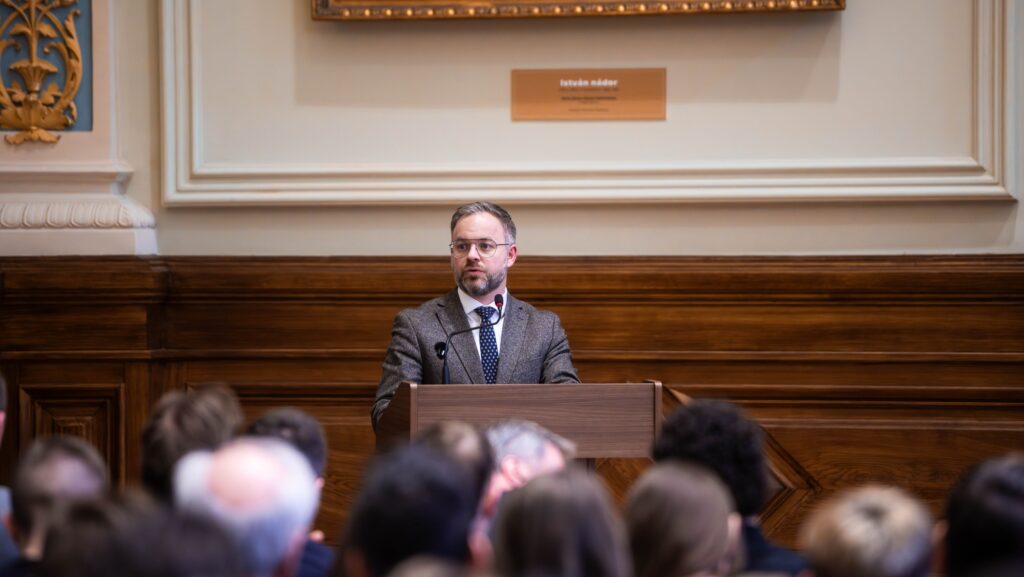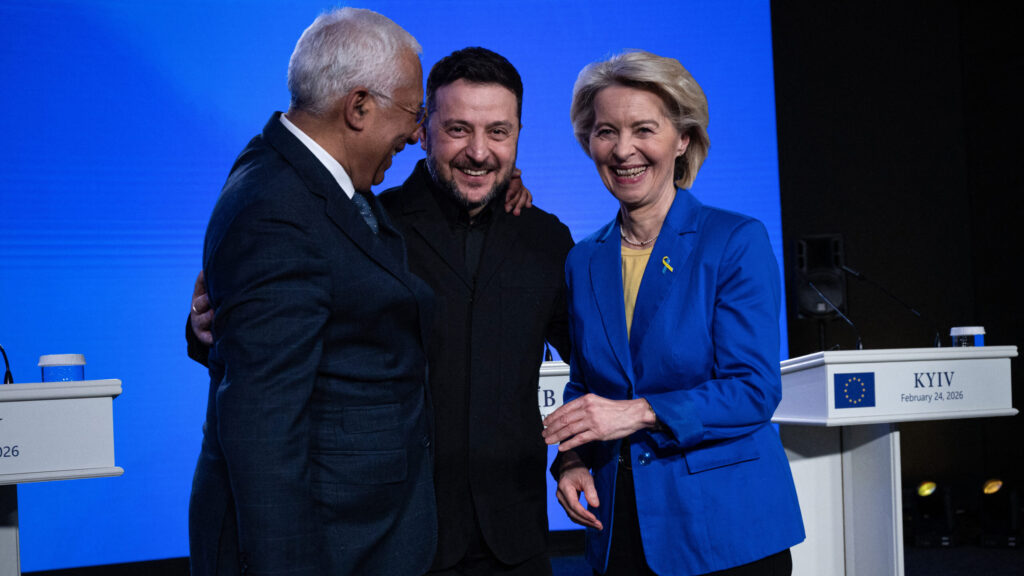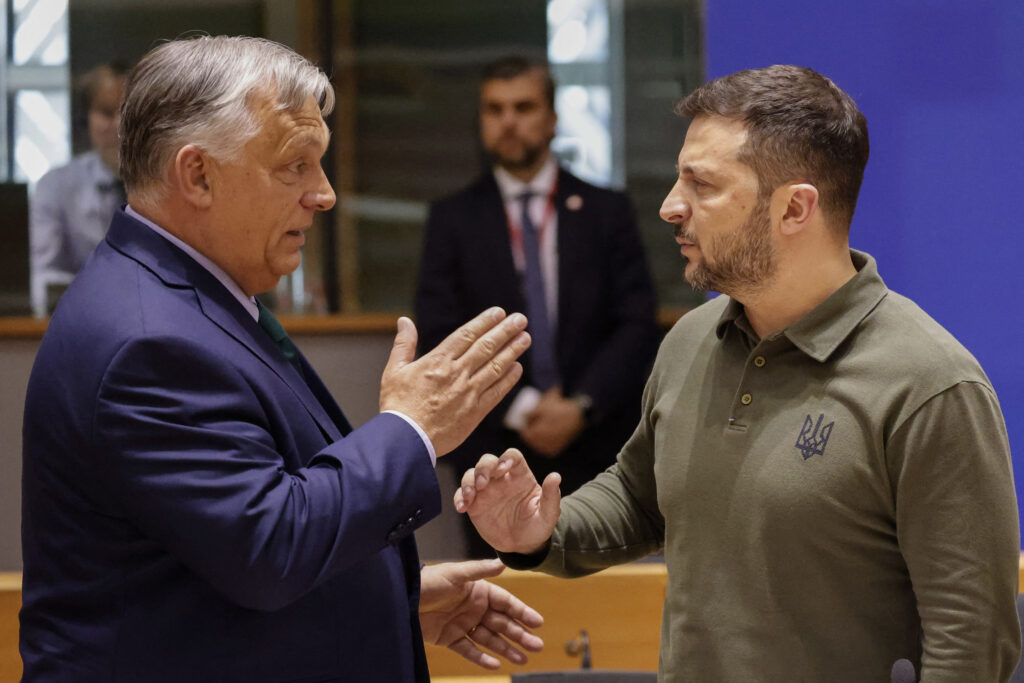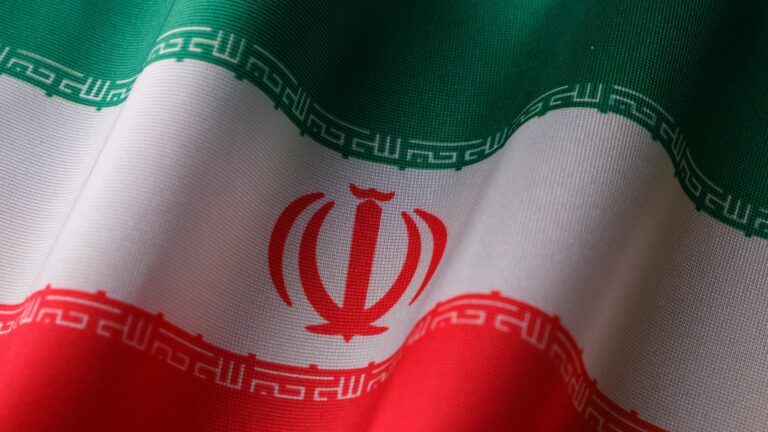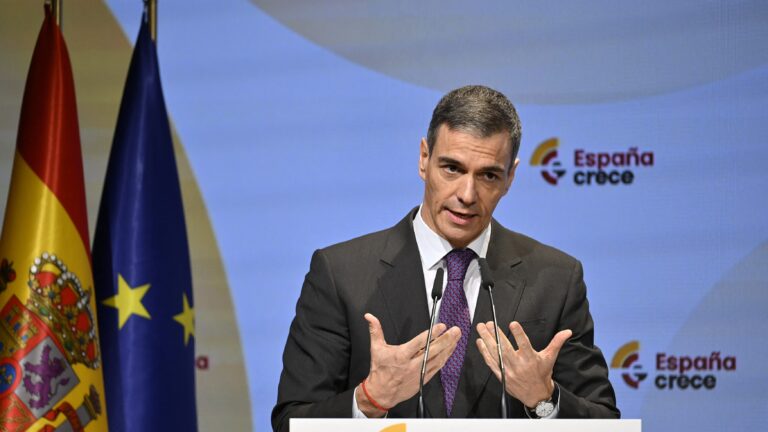Iulian Chifu is a Romanian foreign policy analyst and former presidential adviser. He was Presidential Counsellor for Strategic Affairs and International Security at the Romanian Presidency from 2012 to 2014, Presidential Counsellor for Strategic Affairs, Security, and Foreign Policy from 2011 to 2012 for Romanian President Traian Băsescu, and State Counsellor for Foreign Affairs, Security, and Strategic Affairs of the Romanian Prime Minister from 2021 to 2023. In May 2015, Chifu became one of the Romanian individuals sanctioned by Russia during the Ukrainian war. He is the president of the Center for Conflict Prevention & Early Warning and a professor at the National Defence University in Bucharest. Iulian Chifu specializes in Conflict Analysis, Crisis Decision-making, Post-Conflict Reconstruction, Intelligence, and National Security.
***
This is your first time at the Tusványos Festival, which is a special place. Why not earlier?
I just received the invitation now. I hadn’t received one before, so I simply replied once I got it.
In those years when you were an adviser to the former president, Traian Băsescu, what did you advise him about Tusványos? What was your opinion about this festival?
We didn’t have any discussions related to Tusványos. We had discussions relating to neighbourly relations with Hungary. We also dealt with several issues concerning our intelligence services. So, once we established: ‘look, these are the rules of the game,’ we solved the issue. Actually, there was a good relationship between Prime Minister Orbán and President Băsescu back then, and for sure, now we are also in a great relationship. And if you want facts, here’s one: Hunor Kelemen is the second most cherished party leader after the president of the National Liberal Party, who is also the current Prime Minister.
He is the president of the Hungarian minority party, RMDSZ.
That’s it. And RMDSZ, the Hungarian party, was the most valued partner by the Democratic groupings during the period of forming the coalition. So it shows that they are actually very much involved. And since 1997, they have been part of most Romanian governments. And RMDSZ is a big part of these bilateral relations, as the Hungarian minority in Romania has representatives at all levels.
The reason I asked about the Tusványos case is that Tusványos was a divisive issue for many years in the Romanian political elite; some considered it an assembly of nationalist Hungarians in the heart of Romania, while others said it was a good opportunity to meet and discuss problems.
There were different concepts, different positions on this over time. Here, we had very complicated statements that were even challenged by Hunor Kelemen at some point. So it depends. It’s a legitimate forum, but for sure, nobody is going to accept or applaud extremist positions or irredentist, revisionist statements. But once again, we are normal people. I think that time has healed a number of old differences that we had, and actually, we can’t go back in time. History has put Romanians all over the place in Romania. We can’t change our identity. And once we accept the rules-based order, we are accepting the sovereignty, the territorial integrity and independence of the countries—and that’s a fact. Beyond that, we are both members of the EU and of NATO, and we have the rules about minorities. For sure, some attempt to do more, and there is always debate about the loyalty of minorities. You’ve seen the issues develop, for instance, in Ukraine. How would our state react? How would our citizens react if a war were to break out tomorrow? Surely, it is a matter of citizenship: as long as we have some added values from our state, the state would expect that, if we are experiencing uncomfortable situations, all of its citizens take part in the effort to tackle the enemy—because we are part of the same state.
‘Time has healed a number of old differences that we had, and actually, we can’t go back in time’
We will talk about it a bit later. But first, you mentioned the good relations between the two governments.
We have seen your Prime Minister Orbán visit our Prime Minister in Bucharest.
It’s almost a tradition these years that the Prime Minister starts in Bucharest to visit the Romanian Prime Minister to discuss issues, and after that, he comes to Tusványos, and he gives a fiery speech, and the Romanian elite reacts to that. How do you describe the relations now?
I would say that we have good relations—not the best, but it is a better relationship than we’ve ever had with the Hungarians. The RMDSZ, for a number of years, has been part of the mainstream establishment in Romania. They have played a very important and loyal role toward the Romanian state, politics, democracy and our road inside Europe and NATO. It’s very important for us. Then we have projects that we are developing for the needs of both our citizens, and they are benefiting both parties. There are issues where we have differences, and there are spaces to discuss those together, and we are discussing them frankly, and we are listening to each other’s arguments. But the most important thing is the tolerance towards others’ positions. We can have differences, but we are trying to find a common ground that will help us do more for our citizens and for our countries. But once again, we are stuck here. We are neighbours. Nobody can pick Hungary and put it in the heart of Siberia, or put Romania in the heart of Texas. You know, we have been here for a century, and we need to be rational and put emotions aside, and for sure, we are very attentive to the fact that nobody infringes the law or violates the rights of minorities, who, on both sides, are protected as any other citizens.
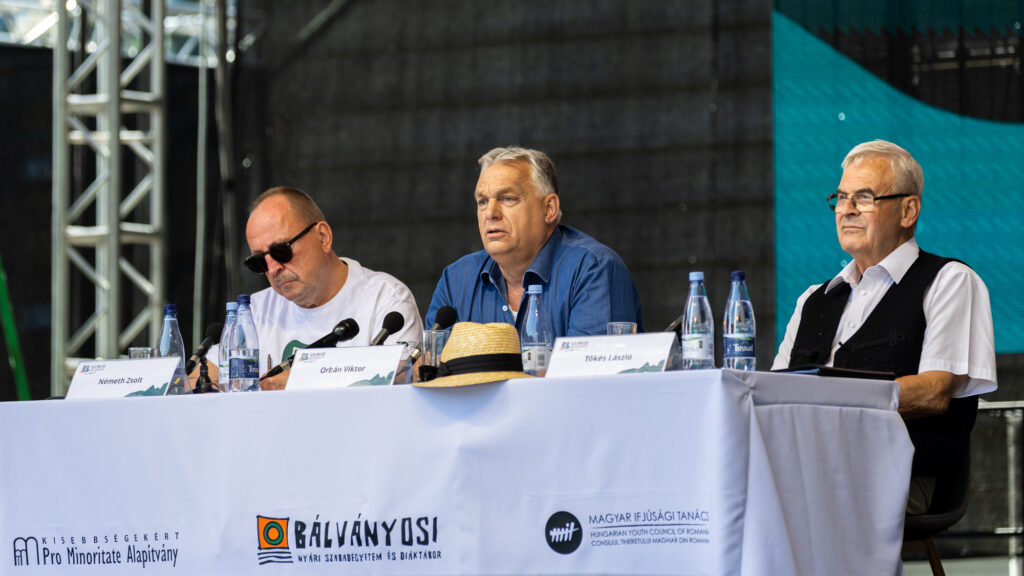
The big issue of the bilateral relations is the minority issue. The Romanian Parliament recently voted down the claim of autonomy for Szeklerland.
It will happen anytime.
What is your position as an analyst on the autonomy claim from Hungarians?
The package that has been promoted by Hungary at the EU level was rejected, and Romania was part of those who opposed the Minority SafePack. The same is true for autonomy—we are not there. We are a state that respects the Constitution, where there is integrity, but is neither federal nor autonomous. There is autonomy for administrative reasons; there’s much autonomy in Hargita, Kovászna, as there is in other places in Romania. We have presidents of the regional councils. There are Hungarians there. They are mayors. They have their councils. They are doing their stuff, respecting the law in Romania and doing the best for their citizens with their budgets, with the help of Romania, with the help of the Hungarian representation in the parliament and in the government—including the very Minister for Development, who is an ethnic Hungarian, and who is an excellent guy, I can tell you, I worked with him during the times of State Council of the Prime Minister some years ago. He is an outstanding professional, and he is also very much linked to solving issues and not to raising symbolic questions and emotional things that are still here. We have to accept it, but once again, the goal is to have a better life.
‘Nobody can pick Hungary and put it in the heart of Siberia, or put Romania in the heart of Texas’
But what about this kind of autonomy claim that the Hungarian minority is asking for? Does it hurt the sovereignty of the Romanian state?
I’m not going to discuss the reasons right now; it will take too much time to get into the details. There are numerous papers related to this, including the Minority SafePack, which was an attempt to obtain this type of autonomy inside the sovereign states in the European Union—and it was rejected. Now there is an attempt to do the same thing regionally. It’s not possible. The tolerance and acceptance of the minority rules involve acknowledging the fact that we have representations of the Hungarian minority, and by the way, not only represented by RMDSZ. They could do more and have more political branches, which shows that they do more for their minority. We strongly support the party that represents the Hungarian community. It’s better for Hungarians to have good representation in parliament and in government, so they can solve more problems through institutions rather than by taking to the streets.
‘Romania was part of those who opposed the Minority SafePack. The same is true for autonomy’
And once again, the Romanian state and government are completely open, and every concrete issue can be discussed. And my very strong argument is that the Development Minister is the one who allocates money for the local projects, and he is an ethnic Hungarian. And moreover, we have seen a number of ministers who were Hungarians, who are in the Supreme Council for Defence, which is the highest security body in Romania—it is the first time that we have ethnic Hungarian ministers in that body. We had a German ethnic man as a president just leaving office, so I don’t think that at this point, anybody can question the fact that Romania respects minority rights, including those of the Hungarian minority.
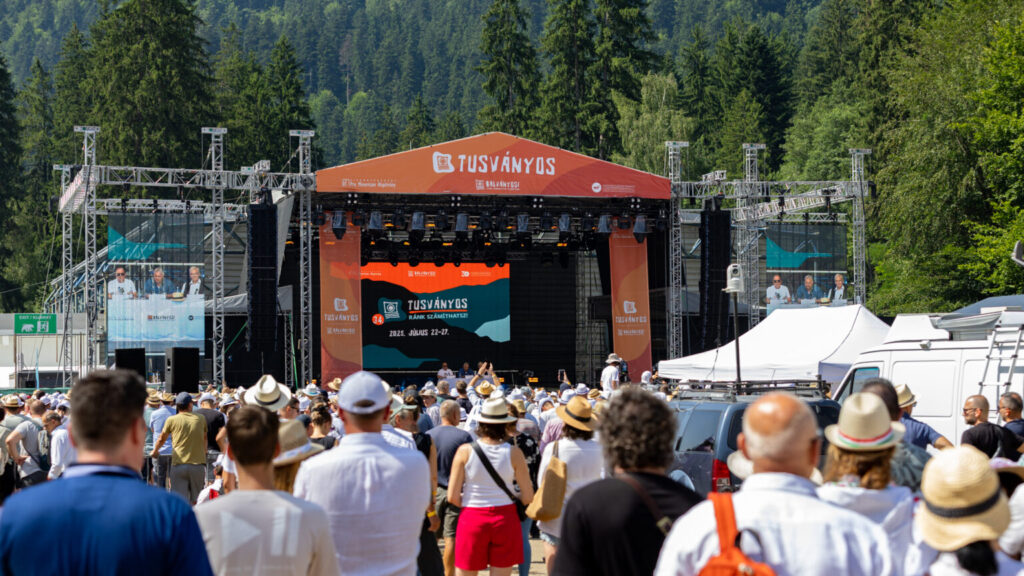
Romania and Hungary are both neighbouring countries to Ukraine, yet these governments have different policies towards Ukraine.
It’s normal, it’s democracy.
The main issue is Ukraine’s possible European Union membership. What is your stance, and how do you see the Hungarian position?
It’s a difference of nuance. First, our government believes that it’s better to engage in dialogue with governments and to solve the issues at the national level, at the regional level, and at the local level. So that’s why we are engaging with the Ukrainian government. Once Hungary feels that it has exhausted the possibility of discussion with Ukraine, and says it’s blocking it, that might work. But the second point is that Ukraine is at war, and it’s defending both of us. It’s defending Europe and NATO’s eastern flank, keeping the Russians somewhere along the line of contact in eastern Ukraine. In such an environment where we have interests of security related to Ukraine, it’s not really comfortable to have those discussions related to minorities or anything else, put in the media in public. We don’t want to harm Ukraine’s position. We have consultations with them, and they are fair, open and straight debates with all the arguments on the table.
‘Ukraine is at war, and it’s defending both of us. It’s defending Europe and NATO’s eastern flank’
But once again, we are respecting Hungary’s position and approach. Romania has very good relations with all the states around here. Romania has good relations with the Arab states and with Israel—that is its tradition. Romania has excellent relations with Serbia, but also with the other states in the Western Balkans. It helps us take part in negotiations, create channels of communication between different parties, and solve a lot of issues that way.
And what about Russia? Romania shares the sentiment of the Baltic states and Poland that Russia is an imminent threat to Europe. Why do you think that?
Because Russia and Putin have set their objectives at the maximum, and those objectives have not changed at all. Secondly, remember the ultimatums of December 2021: one so-called proposal to the US, and another to NATO, which demanded that NATO roll back to its pre-1997 borders—in other words, that we should leave NATO and be left without any security guarantees. And that is not acceptable. It’s an existential threat to Romania and to all the states in the eastern flank.
Does the Moldovan experience play a part in it for you?
I’m not speaking about their interference in the Republic of Moldova—that’s a different thing. Now I’m talking about the EU and NATO, and not about the post-Soviet space, the states that were once communist. The level of Russia’s ambition goes beyond the post-Soviet space, and we have seen that. At the international level, they are claiming a veto role. Recently, we have heard that in the post-Soviet region, there is no true independence, and sovereignty is limited by the interests of Russia itself. It’s not acceptable according to international law and the agreements that Russia itself has signed and thus is a part of. So, it’s unacceptable. And that means Russia is a threat. NATO and the EU recognized this—it’s a fact because it’s based on Russia’s positions towards us and towards Ukraine, which is an independent state.
‘The level of Russia’s ambition goes beyond the post-Soviet space, and we have seen that’
My last question. Romania is a very strong eastern flank of NATO and is getting stronger. Poland is a strong one, but Romania’s strength is increasing significantly. I’m also taking into account Türkiye’s position, because in the Russian relations, many NATO analysts consider it as not a 100 per cent reliable partner, as Ankara is playing games with its strategic partners.
We are strategic partners with Türkiye; we know how to engage with them. We developed a lot of initiatives together with Poland. By the way, we have trilateral relations between Poland, Romania and Türkiye. But yes, it’s a different and difficult one.
Does this situation make Romania’s position stronger within NATO and in the eyes of the US as a reliable partner?
We are never calculating that. No, we are doing that for our own security. By the way, a strategic partnership was signed in 2011, and a trilateral agreement in 2014. Türkiye is a difficult partner, one that firmly defends its own positions, but it’s a partner that has done a lot and has had a very clear stance. They reject anything that hurts their security interests in the Black Sea. But our experiences are rather positive in that type of engagement with them.
The same goes with Poland. We are strategic partners. Our first partnership agreement with Poland was signed in 1922. And later, we hosted the Polish government-in-exile when Poland was split by Nazi Germany and the Soviet Union. We are not aiming to become stronger because of France, the US, or Germany. We need to be as strong as possible to deter threats and to defend Romania and Romanian citizens of any origin and of any ethnicity. The most current threat is Russia, for sure. And we need to pay attention and defend all our citizens.
Watch the full podcast below:
Nobody can put Hungary in Siberia or Romania in Texas | Danube Lectures
Listen on Spotify: https://open.spotify.com/episode/1P4tVA7CiJ5lFE2ftGkvGP?si=ZEs5DmdMTUuvSweUuA1I0Q 0:00 – Introduction 0:54 – As an advisor to the former president, what did Iulian Chifu advise Traian Băsescu about Tusványos? 2:50 – Why has Tusványos been a divisive issue for many years in the Romanian politics? 5:26 – How can Hungarian-Romanian relations be described now?
Related articles:


